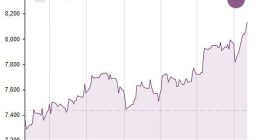MILLIONS of households will see their monthly pay cheques grow over the coming months.
Kwasi Kwarteng announced a vast swathe of tax cuts in his recent Mini Budget which could save the average worker £500 a year from next April.
The Chancellor brought forward a plan cut to income tax by 1p and will reverse a 1.25% point hike to National Insurance.
The cut to National Insurance comes into force from November 6 and will save the average worker £330 a year.
The 1p cut to the basic rate of income tax comes into force from April 2023 and will save the average worker £170 a year.
But, the exact amount that you will save will depend on how much you earn.


The Chancellor unleashed the biggest tax cuts bonanza since the 1980s to make millions of households better off within weeks.
Mr Kwarteng said: “We will deliver higher wages, greater opportunities, and fund public services, now and into the future.”
It come at the same time that the Chancellor announced:
We’ve listed how much more you are predicted to take home with the cut to income tax and insurance from April 2023.
Most read in Money
How much will I save monthly from the cut to National Insurance?
The amount of savings you make from tax cuts will be dependent upon how much you earn.
Personal finance experts at Hargreaves Lansdown have calculated how much you’ll save from the national insurance cut:
- £15,000p.a. – save £2.03
- £20,000p.a. – save £6.19
- £25,000p.a. – save £10.36
- £30,000p.a. – save £14.53
- £35,000p.a. – save £18.69
- £40,000p.a. – save £22.86
- £45,000p.a. – save £27.03
- £50,000p.a. – save £31.19
- £55,000p.a. – save £31.42
- £60,000p.a. – save £31.42
How much will I save monthly from the cut to income tax?
Here’s how much more you’ll take home each month thanks to the 1p cut to the basic rate of income tax:
- £15,000p.a. – save £2.53
- £20,000p.a. – save £7.74
- £25,000p.a. – save £12.95
- £30,000p.a. – save £18.16
- £35,000p.a. – save £23.36
- £40,000p.a. – save £28.57
- £45,000p.a. – save £33.78
- £50,000p.a. – save £38.99
- £55,000p.a. – save £44.20
- £60,000p.a. – save £49.41
How much will I save each month in total?
The amount you’ll save from both tax cuts quickly adds up:
- £15,000p.a. – save £4.56
- £20,000p.a. – save £13.93
- £25,000p.a. – save £23.31
- £30,000p.a. – save £32.68
- £35,000p.a. – save £42.06
- £40,000p.a. – save £51.43
- £45,000p.a. – save £60.81
- £50,000p.a. – save £70.18
- £55,000p.a. – save £75.61
- £60,000p.a. – save £80.82
What is National Insurance?
National Insurance is a tax on your earnings, which is put into a fund to use for some state benefits.
This includes the state pension, statutory sick pay, maternity leave and unemployment benefits.
If you are a UK national, you should receive an NI number and card automatically before you turn 16.
This number allows the government to track your earnings and apply the right amount of tax.
Who currently pays it?
You pay National Insurance if you’re 16 or over and either:
- an employee earning above £242 a week
- self-employed and making a profit of £6,725 or more a year
It is deducted from your wages each month.
If you’re employed, you can see your contributions by looking at your pay slip.
Once you reach state pension age, you don’t need to pay it at all.
There are different types of National Insurance – known as “classes” -, and the type you pay depends on your employment status and how much you earn, and whether you have any gaps in your National Insurance record.
What are the thresholds and how much do I pay?
The threshold for National Insurance payments is currently £12,570 a year for employed workers and £6,725 for self-employed people.
At the moment, most people pay 13.25% on anything they earn up between £242 and £967 per week. You have to pay 3.25% on anything you earn over £967 a week.
From November 6, individuals will pay 12% on any earnings between £242 and £967 a week.
What is income tax and my personal allowance?
The personal allowance is the amount you can earn each year tax-free.
It can change from one year to the next and is set by the government.
In the current tax year – which runs from April 6 2021 to April 5 2022 – the figure is £12,570.
However, this amount may be bigger if you claim certain allowances including, blind person’s allowance, marriage allowance and child tax credit.
You will also not have to pay tax on savings interest, dividends and the first £1,000 of income if you are self-employed.
How do I calculate income tax?
If you earn £12,570 or less, you currently pay no income tax.
On earnings between £12,570 and £50,270, you pay the basic income tax rate of 20%.
However, the basic rate of income tax will be slashed from 20p to 19p from April 2023.
Wages of £50,271 and above are taxed at the higher rate of 40%.
Anyone who earns over £100,000 does not get any tax-free personal allowance – they will pay income tax on everything they earn.
The thresholds for income tax generally rise each year so that people can earn more without paying more tax.


Right now, income tax thresholds will be frozen until 2026.
Though this isn’t a tax rise, it is a small stealth pay cut as rising levels of inflation are likely to carry people into higher tax bands.
This post first appeared on thesun.co.uk









